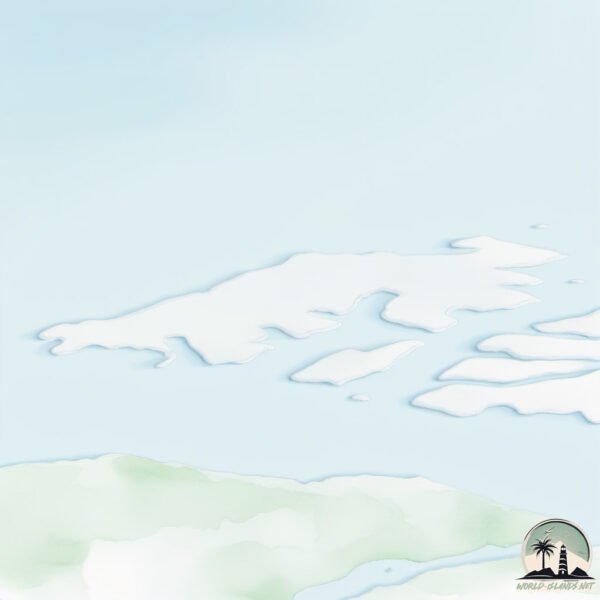Prince Patrick

Welcome to Prince Patrick, a Polar island in the The Northwestern Passages, part of the majestic Arctic Ocean. This guide offers a comprehensive overview of what makes Prince Patrick unique – from its geography and climate to its population, infrastructure, and beyond. Dive into the details:
- Geography and Size: Explore the island’s size and location.
- Climate and Weather: Weather patterns and temperature.
- Topography and Nature: Uncover the natural wonders of the island.
- Infrastructure and Travelling: Insights on reaching, staying, and making the most of your visit.
- News and Headlines: Latest News.
Geography and size of Prince Patrick
Size: 15792 km²
Coastline: 3797 km
Ocean: Arctic Ocean
Sea: The Northwestern Passages
Continent: North America
Prince Patrick is a Giant Island spanning 15792 km² with a coastline of 3797 km.
Archipel: Parry Islands – Located in the Canadian Arctic Archipelago, the Parry Islands are known for their stark and rugged Arctic landscapes. This group of islands is largely uninhabited and covered with ice for most of the year. The archipelago is named after Arctic explorer William Edward Parry and is a crucial area for Arctic research, wildlife observation, and exploration of polar environments.
Tectonic Plate: North America – Covers North America and parts of the Atlantic and Arctic Oceans, characterized by diverse geological features and varying levels of seismic activity.
The geographic heart of the island is pinpointed at these coordinates:
Latitude: 76.68931891 / Longitude: -118.92644312
Climate and weather of Prince Patrick
Climate Zone: Polar
Climate Details: Tundra
Temperature: Cold
Climate Characteristics: The tundra climate features long, extremely cold winters and short, cool summers. Vegetation is limited to mosses, lichens, and small shrubs due to the low temperatures and short growing seasons. Biodiversity is low, but some specialized species thrive.
Topography and nature of Prince Patrick
Timezone: UTC-07:00
Timezone places: America/Denver
Max. Elevation: 249 m
Mean Elevation: 47 m
Vegetation: Snow and Ice Covered
Tree Coverage: 11%
The mean elevation is 47 m. The highest elevation on the island reaches approximately 249 meters above sea level. The island is characterized by Hills: Gently sloping landforms with rounded tops, having a maximum elevation between 200 and 500 meters. Hills contribute to a varied landscape on islands.
Dominating Vegetation: Snow and Ice Covered
These areas are permanently or seasonally covered in snow and ice, with little to no vegetation, such as polar regions and high mountains. Prince Patrick has a tree cover of 11 %.
Vegetation: 6 vegetation zones – Very Highly Diverse Island
Islands in this range are ecological powerhouses, showcasing a wide array of vegetation zones. Each zone, from lush rainforests to arid scrublands, coastal mangroves to mountainous regions, contributes to a complex and interdependent ecosystem. These islands are often hotspots of biodiversity, supporting numerous species and intricate ecological processes.
Infrastructure and Travelling to Prince Patrick
Does the island have a public airport? no.
There is no public and scheduled airport on Prince Patrick. The nearest airport is Sachs Harbour (David Nasogaluak Jr. Saaryuaq) Airport, located 524 km away.
Does the island have a major port? no.
There are no major ports on Prince Patrick. The closest major port is SACHS HARBOR, approximately 527 km away.
The mean population of Prince Patrick is 0 per km². Prince Patrick is Uninhabited. The island belongs to Canada.
The name of the island resonates across different cultures and languages. Here is how it is known around the world: Arabic: جزيرة الأمير باتريك; German: Prince Patrick Island; Spanish: Isla del Príncipe Patrick; French: île du Prince-Patrick; Portuguese: Ilha Prince Patrick; Russian: Принс-Патрик; Chinese: 帕特里克王子岛
Continuing your journey, Queen Elizabeth is the next notable island, situated merely km away.
Mould Bay on Prince Patrick Island | Queen Elizabeth Islands, Arctic Archipelago, Canada



Canada is classified as Developed region: G7: Group of Seven – Major advanced economies, including Canada, France, Germany, Italy, Japan, the United Kingdom, and the United States. The level of income is High income: OECD.
News – Latest Updates and Headlines from Prince Patrick
Stay informed with the most recent news and important headlines from Prince Patrick. Here’s a roundup of the latest developments.
Social Media Posts about Prince Patrick
Please note: The data used here has been primarily extracted from satellite readings. Deviations from exact values may occur, particularly regarding the height of elevations and population density. Land area and coastline measurements refer to average values at mean high tide.
